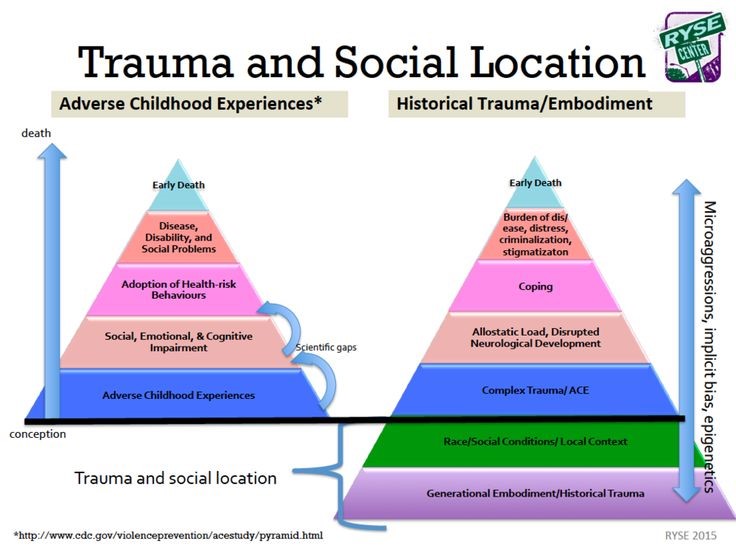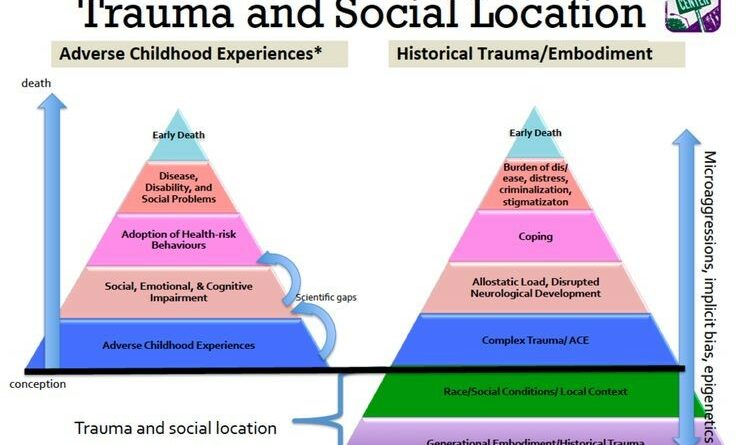Adverse Childhood Experiences, Childhood Trauma, Epigenetics & Long-Term Health Outcomes
Understanding Childhood Trauma, Epigenetics, and Adverse Childhood Experiences and how they impact long-term health outcomes and life choices.

Introduction
For years, great minds have been tasked to gain a lucid perspicacity for the inexplicable behavior of many African Americans. While there have definitely been several African Americans who have done extraordinary things and accomplished what many believed to be the impossible, the overwhelming majority of the descendants of American chattel slavery have not progressed one iota since 1865. We learned much from Frantz Fanon and his masterful work in the mid-twentieth century. We were able to gain a reasonable resipiscence of the influence of colonization on the minds and behavior of those who have fallen victim to it. While American Chattel Slavery was far more than the colonization of a race of people, the basic principle of psychological influence is still at play.
Great master teachers like Dr. John Henrik Clarke, Dr. Amos Wilson, and others went to immeasurable lengths to explain the psychological influence of forceful domination and the presentation of an alien image of God, creating an identity crisis and inferiority complex in one move. Dr. Na’im Akbar and Dr. Joy DeGruy both showed how the trauma of chattel slavery and the subsequent years of perpetuated trauma through convict leasing (the precursor to the private prison industrial complex), reconstruction, Jim Crow segregation, the mis-education of our youth, the school-to-prison pipeline, mass incarceration, forced serial displacement, the disintegration of the black family nucleus and more has negatively impacted the vast majority of African Americans.
So, I entered this arena having some very broad and powerful shoulders on which to stand. I am grateful to my ancestors, elders, and contemporaries for the paths they have paved, and it is my passion and goal to take it as far as I can, before passing it on to other great and youthful minds. I have invested a substantial amount of time over the last 20-plus years in understanding the cognitive nature and origin of much of the erroneous behavior displayed by an overwhelming number of blacks. I have not been willing to accept the suggestion that African Americans’ destructive and counterproductive behavior is inherently a part of who we are.
Scholars of multiple races and nationalities have warned us not to ignore the impact of 400 years of slavery and the carnage that followed, understanding how the mind responds to trauma, I have to agree. However, my studies and research led me to something that had not been given much attention in our attempt to understand how we arrived at where we are today.
What if I told you the phrase “failure is in your DNA” was more accurate than you ever realized? Then, what if I told you that despite what you have been told about DNA and how it works, while you cannot change the genetic code itself, you can alter gene expression, meaning that although you are the person created by the 23 chromosomes from your mother and the 23 chromosomes from your father, you are not doomed to repeat their failures, or carry their demons. Their trauma is not yours to hold and protect. You can refocus your gene expression and reshape your destiny, but it will take hard work, especially when it involves an entire collective.
Get your signed copy of Marion’s book, Ghettos Forgotten Daughters!
Welcome to the World of Epigenetics
Before moving forward, it is essential to provide a simple definition of the term “epigenetics.” Epigenetics is the function and the study of heritable changes in gene expression (active versus inactive genes) that do not involve changes in genetic sequence — a change in phenotype without changing the genotype. Basically, it is the genetic transmission of certain proclivities toward thoughts, behaviors, disease vulnerability, etc.
It is essential to understand that the field of epigenetics does more than expatiate the behavior of a specific person or group. It also deals with micro-genetic adaptation, disease and mental disorders vulnerability, and more.
This short entry is not meant to be an in-depth explanation of epigenetics and how it impacts African Americans, nor is it an academic submission on the topic. This is simply meant to give the reader a peek inside of the explosive possibility of freeing the descendants of slaves from the intergenerational expression of trauma-related behavior associated with the slavery experience.
Epigenetic Tags
Avoiding technical vernacular as much as possible, an epigenetic tag is an impression upon a gene that functions as an on-and-off switch — turning specific genes on and others off. Epigenetic tags can either increase the proclivity for violent behavior or make a person completely docile. It can make a person more vulnerable to mental disorders like depression, PTSD, ADHD, and more. While these epigenetic tags can be passed on to the progeny of the carrier, nature has a way of removing most of them during the reproduction process. Let’s take a quick look at how this happens.
The body has an excellent way of repairing and replenishing itself, known as mitosis. During mitosis, a single cell divides itself, creating two new cells identical to itself. However, the reproductive cells — the male sperm and the female ovum — are produced through a unique process known as meiotic cell division. During meiosis, the cell reduces itself to half the normal chromosome count and changes its shape. Meiosis is the basis for genetic variation — the reason one man and woman can procreate multiple times and not create identical children — except for identical twins — the result of a split of the ovum after fertilization — meaning that the twins share the exact same DNA sequence (their genetic code is identical).
What is ironic here is the fact that it is epigenetics that explains how identical twins become more distinct from one another as they age.
The meiosis process involves several types of cell divisions, with the first being the reduction of chromosomes to half (down to 23 from 46). This allows the merging of 23 chromosomes from the mother and 23 chromosomes from the father. The meiotic process shuffles the genetic code within the chromosomes to create the variance in the genetic code of the couple’s progeny, with the exception of identical twins.
Keep in mind that this process is also where epigenetic tags are removed from the chromosomes, at least for the most part. While the parent does not pass on all of their tags, they do pass on the most profound, so a parent that has suffered extensive trauma will likely pass on their epigenetic tag created by that trauma, and that tag can turn on genes that will cause the progeny to react to the trauma although they did not directly experience it. There have been reports of the children of Holocaust survivors having vivid dreams of actual events that took place before they were born, events their parents did not share with them. While this is still being studied, we can at least be cognizant of the genetic connectivity in the way of reality perception.
A Quick Peek Inside
Epigenesis has been an accepted field of study since the mid-twentieth century; however, the focus has always been on micro-adaptation, at least until recently. We now know that the epigenetic transmission of what can be called genetic scarring associated with mental and physical trauma can be passed to the progeny of the person who experienced the events, making them more susceptible to the same occurrence and more likely to behave like the progenitor.
These relatively new discoveries come on the heel of the advancing genome-wide high throughput technologies that have allowed more comprehensive genotype screenings that involve both diseased and controlled groups. Currently, there is an effort within the world of clinical research focused on supplementing the current empirical data with efforts on the genomic level involving endeavors in elucidating the proteome, epigenetic profiles, and transcriptome.
What has proven to be most appealing about epigenetics is the rapidly accumulating evidence that reveals the powerful and lasting impact of adverse life events and how it is reflected in covalent modifications of the chromatin.
2022’s hottest home-based business opportunities – Register now!
The Jewish Holocaust
My introduction to the world of epigenetics was by chance. It was something I discovered while studying how European Jews dealt with the trauma associated with the atrocities they suffered during the 12-year span of the Holocaust. Studying the Jews revealed a number of powerful elements that differentiate how they responded to their traumatic event compared to the African American response to slavery and the subsequent atrocities that followed it.
- The Jews don’t refer to themselves as victims of the Holocaust; they refer to themselves as survivors.
- They were cognizant enough of their trauma that they invested significantly in studying it to determine the best ways to ensure that they recovered as soon as possible. Basically, they did not want their grandchildren to still experience dysfunction based on what they had endured. The current data reveals that the third generation expresses very little influence from the Holocaust outside of being aware of it and its significance.
- They were even willing to examine their trauma on the genetic level. They were never in denial. They knew something was wrong and were determined to discover and confront it. This is where epigenetics comes in.
- Jews were immensely racially socialized, understanding who they were as individuals and as a race. With this understanding, they were aware of their responsibility to one another. This responsibility drove them to invest in research to understand their trauma.
Nearly 30 years ago, I set out to answer a piercing question at the heart of an enigma that yearned to be solved. The question can be summed up by the need to develop a lucid perspicacity of the forces at play that resulted in 120 years (153 years currently) of quasi-freedom for Blacks with virtually no substantive social, political, or economic progression. My background in psychology led me to an initial theory entitled Collective Cognitive Bias Dominance Theory, which proposed that Blacks were suffering from a collective distortion in our thinking, paradigms, social views, and more. This theory suggested that the slavery experience resulted in a maladaptation in social reasoning.
While I was able to uncover a wealth of empirical data as well as accumulate new data to support the CCBD theory, it was not long before I realized that there was substantially more at play than a warped sense of thinking that had been passed down through social learning theory and cognitive distortions. It seemed that psychopathological behavior was somehow ingrained into the psychology of a large percentage of Blacks in this country and other colonized geographic locations.
This gap between what I could prove concerning cognitive influences on the behavior of a large portion of the Black collective forced me to examine the intergenerational transmission of trauma. While researching intergenerational trauma, I was introduced to the world of epigenetics. In simple, epigenetics is the study of heritable changes in gene expression that do not involve changes to the underlying DNA sequence — a change in phenotype without a change in genotype — which in turn affects how cells read the genes.
- Every cell in the body has the ability to read DNA sequences and interpret and transcribe what it reads to determine how it will express itself. Environmental influences create what are known as epigenetic tags that have the ability to activate and deactivate genes based on cellular transcriptions. This explains how identical twins — sharing identical DNA- can end up with different physical outcomes. One twin dies early from cancer, while the other lives to be 95 years old. Environmental experiences serve to rewire genetic expression causing abnormal cellular mutation — resulting in disease.
Looking At the Broader Picture
While my research began with a focus on the Black collective and the central issues therein, I quickly learned that epigenetics was not confined by race, socioeconomic status, political affiliation, etc. People from all backgrounds deal with epigenetic influences to varying degrees. Yes, Blacks have unique experiences that contribute to our current conditions, and these experiences must be addressed and mitigated to see significant and lasting change. I want to focus here on another group that has been impacted by epigenetics — children.
As it turns out, childhood trauma significantly impacts social development, brain function, and general health. The Adverse Childhood Experiences Study, a study sponsored by the CDC and Kaiser, produced startling results that illuminated a health epidemic that was unaddressed at the core level. The study examined the impact of childhood trauma on the overall health of children and adults.
For the purpose of brevity, I am going to simplify the elements of the study, which involved 17,000 subjects between 1995 to 1997. The study looked to identify what it classified as adverse childhood experiences (ACEs). These experiences included:
- Physical and emotional sexual abuse
- Physical and emotional neglect
- Parental mental illness
- Dometic violence
- Substance abuse
- Incarceration
- Parental separation (divorce or legal separation)
Each of these unique experiences was given a point value of one during the study. It was discovered that 67 percent of the subjects had at least one point (one adverse childhood experience), and at least one in eight had four points or higher. The correlation here is that the higher the score, the poorer the health outcome of these subjects. That’s right; adverse childhood experiences directly correlate with predictable health outcomes. An increased ACE score impacts multitudinous birth cohorts, but there are five highly prevalent areas worth noting — depression, certain forms of cancer, sexual promiscuity, ischemic heart disease, and arrested brain development.
One noteworthy finding is the fact that an ACE score of four increases the risk of suicide by 12 times.
While specific health issues can be connected to poor lifestyles and poor decisions, the conditions under which these decisions are made are not adequately understood. When a child or an adult experience trauma in the form of any threat, especially those listed as adverse childhood experiences, it triggers a fear response that shuts down the prefrontal cortex, which is responsible for making executive decisions and impulse control. In situations where you have seen inexplicable behavior in which you knew the person knew better, it could be that they were functioning through the lack of inhibition created by the incapacitated prefrontal cortex. There was no impulse control.
In addition to the fear response, there is the stress response, which activates the hypothalamus — sending a signal to the adrenal gland to produce adrenaline and cortisol — placing the body in fight or flight mode. This is a great thing to have when you are in the wild and stumble upon a lion or a tiger. The rush of adrenaline and cortisol prepares you to either run or defend yourself. This stress response also pulls blood (oxygen) from major organs like the heart and brain to send to your extremities to support combat or flight. This is not a problem as long as the experience is short-lived (happening over the course of seconds). However, what is the outcome when you are constantly bringing the lion home with you — constantly experiencing the fear and anxiety associated with paradigms that adverse childhood experiences have shaped? Something that was meant to save you ends up killing you.
A Deeper Look At “Environment”
When we speak of the environment, most people tend to think of things like the home and community and maybe even what a person eats regularly. Ischaemic heart disease is the number one killer in the western hemisphere, which includes the United States. Most people either view ischaemic heart disease as a result of genetics or poor diet. What should be considered is the fact that a person with an ACE score of four or higher significantly increased BMI, WC, and an increased resting heart rate.
Dr. Bassel van der Kolk, one of the foremost leading trauma experts, points out that the body keeps the score when it comes to trauma. The act of becoming traumatized by an event is first physiological (experienced in the body) and then psychological (processed through the mind). The body’s absorption and processing of trauma have a massive impact on health outcomes. Literally, every cell in the body records the traumatic event, leading to future episodes where the subject will relive (not the same as remembering) the event. This is referred to as traumatic memory. Without knowing it, many people are living their lives through the lens of traumatic memory. They tend to see everything as a form of aggression—a threat.
There is a standing belief that children are highly resilient, which they are; however, the presence of resilience does not exempt children from the residual negative impact of ACEs.
Common Misdiagnosis
One of the most common misdiagnoses among children under the age of 10, especially males, is ADHD. As we learn more about the impact of ACEs on human behavior as children and adults, we discover that what was once believed to be symptoms of ADHD is most likely the result of untreated ACEs. ADHD, which is usually treated with stimulants like Vyvanse, Adderall, Ritalin, and Concerta, is a phantom used to explain both natural and disruptive behavior in young children. Children learn better through movement and discovery, not by sitting still and listening, so a certain amount of hyperactivity should be expected. When this behavior becomes excessive, it is often due to exposure to multiple ACEs.
Interestingly, this is not primarily a racial or socioeconomic issue. While some groups are impacted more, almost everyone has been impacted by it or knows someone who has. How many people reading this has a person in their family who drinks too much? What about someone whose parents were divorced when they were young? Are there any readers who witnessed domestic violence as a child? The statistics bear out the fact that regardless of race or socioeconomic status, approximately 67 percent of the population has an ACE score of at least one. Unfortunately, the number is higher for Blacks.
While there is still work to be done in the area of quantitative and qualitative research, it is clear that the use of ACEs is a predictive mechanism to help identify potential poor health outcomes long before they occur. We should also work to reduce ACEs whenever possible.
What we do know now about epigenetics is that although a child is stuck with the genetic code passed on to them by their parents, they are not doomed to repeat the failures of their parents. They can improve the quality of their gene expression by the environment and stimuli they expose themselves to. Conversely, they can diminish the quality of the gene expression by exposing themselves to hostile and counterproductive environments, including abusive relationships, drug abuse, untreated mental disorders, and more.
I believe that we start with our youngest members and develop programs that introduce them to who they are. Identity is key. We must use this identity to reconnect to one another in a way we recognize the value and worth in every black life. We must make ourselves responsible for the environment in which every black child is reared and educated. We must stop looking to exogenous sources for elevation, liberation, and empowerment. That has to be an autogenously responsive action.
At The Odyssey Project, I have designed and implemented numerous programs and initiatives designed to address the enigmatic issues we face, and these programs are the result of the research done through The Odyssey Project. From the Black Community Empowerment Initiative (Which includes holistically educating youth, teaching financial literacy to parents and children, promoting black enterprise, etc.) to helping parents nationwide create African American Parent Advisory Councils to oversee public school districts and their treatment of African American students, we have planted ourselves in the heart of the struggle.
I believe that the only way that we can rise as a people is to live as a unified people. We cannot stand alone, each in his or her sphere of influence, and expect to topple this machine of institutional racism. We must develop an organized and focused spending agenda that will allow us to leverage our money to create power and influence. We must recapture the understanding of the importance of the Black family and rebuild the family from the ground up. We must holistically educate our youth from the moment of self-awareness. Black men have to be willing to assume the role of protector, provider, and leader — not only in the home — but in the community as well, because we will only get as far as our men (as a collective) can lead us. The Black woman must learn to exercise her extraordinary spiritual strength to encourage and empower the men and elevate our communities because we will only go as high as our women can lift us. We must be unified.
While many may not understand how epigenetics plays into this, it, along with cognitive biases and cognitive distortion, are key components we must master in understanding.
This morning, I posted that white people don’t have superpowers. They are not superior to Blacks. The only thing that white people have that we don’t is a strategized plan, and they are working the hell out of it at our expense. My people, it is time for us to get a plan! ~ Rick Wallace, Ph.D., Psy.D.






